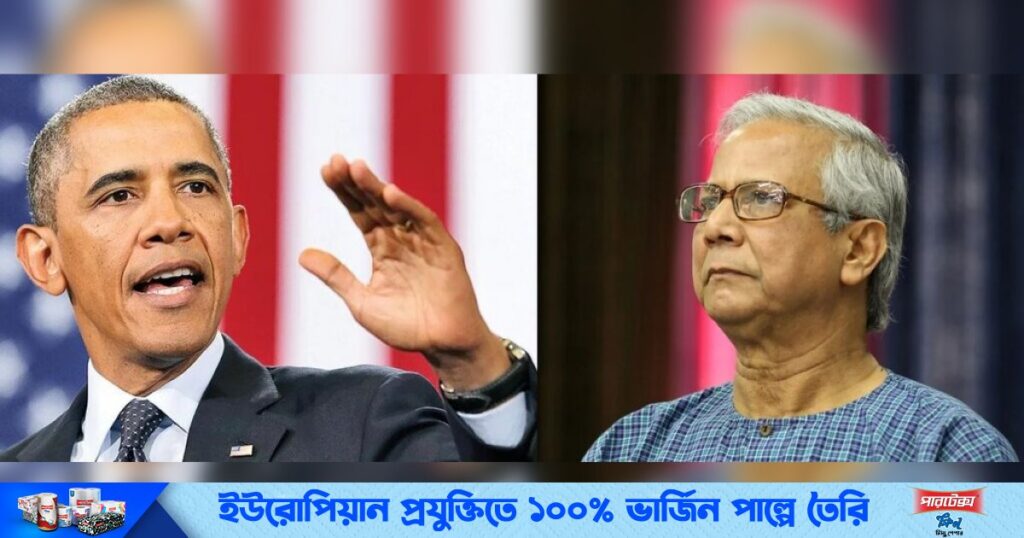On July 23, the Supreme Court of Bangladesh upheld a lower court decision that said Mohammed Yunus must pay taxes on $7 million of donations he made between 2011 and 2014 to three trusts — Professor Muhammad Yunus Trust, the Yunus Family Trust and the Yunus Centre. The apex court ruled that these donations are not exempted under any existing laws. Yunus has been asked to pay a hefty $1.4 million in taxes.
On August 17, former US President Barack Obama wrote a letter to Yunus, extending the support on behalf of millions of people whose potential he invested in.
“I have long been inspired by your efforts to empower people through offering them the means to lift their families and communities out of poverty. As I said when having the opportunity to meet you in the White House in 2009, your work has inspired millions to imagine their own potential,” Obama wrote in his letter, which was published on the Yunus Center’s home page on August 28.
During this period, I hope it gives you strength to know that many whose potential you invested in, and those of us who care about a more equitable economic future for all, are thinking of you, and I hope that you continue to have the freedom to do your important work, the former US President writes further.
Last year, Bangladesh’s anti-corruption watchdog initiated a wide-ranging investigation into the firms Yunus chairs even as Sheikh Hasina’s diatribe against Yunus became more personal and vitriolic. She blamed him for the World Bank pulling out of a major river bridge project, which previously earned bad press on corruption allegations. At the launch of this river bridge, Sheikh Hasina reportedly remarked that Yunus should be drowned in the same river.
In March, 40 prominent global figures, including former US Secretary of State Hillary Clinton and former UN Chief Ban Ki-moon, published a joint letter in a full-page Washington Post advertisement, calling on Bangladesh to desist from unfair attacks and harassment of Yunus.
The latest Supreme Court ruling is part of an unending hostility unleashed against Yunus by the Sheikh Hasina government. For example, Yunus is facing labour law violation charges levelled against him by some Grameen Bank employees as the tussle to wrest control of the legendary institution intensifies. The Bangladesh government filed criminal cases against Yunus despite the dispute being civil in nature.
On August 27, in a joint letter, thirty-four eminent personalities from Bangladesh expressed their concern over the cases filed against the 2006 Nobel Peace Prize winner and found of Grameen Bank.
These eminent personalities alleged that despite the civil nature of the allegations, the government has criminal cases against Yunus. In the past, Yunus has been subjected to continuous harassment by the Sheikh Hasina government, which saw Yunus and his institutions undergo audits, investigations, and interrogations, with a threat to arrest him.
“He continues to experience hostility in different forms from various levels of the government. Considering all these factors, we believe the criminal case against him in the Labour Court is driven by ulterior motives. This deeply concerns us,” the statement signed by thirty-four eminent Bangladeshi personalities read.
“We urge the government to stop all forms of harassment and biased hostilities against Dr Yunus,” it reads.
The signatories include Educationist Abul Kashem Fazlul Haque; former adviser to the caretaker government Hafiz Uddin Khan; human rights activist Hameeda Hossain; former cabinet secretary Ali Imam Majumder; economist Debapriya Bhattacharya; Shushashoner Jonno Nagorik editor Badiul Alam Majumdar; legal expert Dr Shahdeen Malik; human rights activist Sharmin Murshid; environmental lawyer Syeda Rizwana Hasan; Prof Ali Riaz; Prof Asif Nazrul; photographer Shahidul Alam; Prof CR Abrar; Prof Parveen Hasan; Prof Firdaus Azim; and human rights activist Shirin Haque.
The coming forward of these personalities in support of Yunus is a significant development as it marks the comeback fight of intellectuals, who have been frustrated by the rise of fundamentalists and hooligans on the one hand and the brutal state power on the other in Bangladesh. Taking the political discourse to ulterior levels may serve the interests of a section of the people, but it’s ultimately a misadventure that everyone has to pay for. Bangladesh is slated to hold its national elections in January 2024.
Meanwhile, Yunus has been invited to speak at the World Football Summit as a Keynote Speaker on September 20-21 in Seville, Spain. This is a beautiful city! (IPA Service)

 Jayanta Mahapatra Has Left A Lasting Legacy Of His Poems On Pain And Longing
Jayanta Mahapatra Has Left A Lasting Legacy Of His Poems On Pain And Longing 